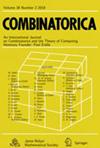比赛中的闪光和彩虹
IF 1
2区 数学
Q1 MATHEMATICS
引用次数: 0
摘要
用任意数量的颜色给顶点集 \({\{1, 2, \dotsc, n\}\}) 的完整图的边着色。如果 \(n > f(l,k)\) 那么一定存在长度为 l 的单调单色路径或长度为 k 的单调彩虹路径,那么 f(l, k) 的最小整数是多少?Lefmann、Rödl 和 Thomas 在 1992 年猜想 \(f(l, k) = l^{k - 1}\ 并证明了 \(l \ge (3 k)^{2 k}\ 的这一猜想。)我们证明了 \(l\ge k^3 (\log k)^{1 + o(1)}\) 的猜想,并建立了一般上界 \(f(l, k) \le k (\log k)^{1 + o(1)}\cdot l^{k - 1}\).这将最佳下界和上界之间的差距从指数级缩小到 k 的多项式级。本文章由计算机程序翻译,如有差异,请以英文原文为准。
Flashes and Rainbows in Tournaments
Colour the edges of the complete graph with vertex set \({\{1, 2, \dotsc , n\}}\) with an arbitrary number of colours. What is the smallest integer f(l, k) such that if \(n > f(l,k)\) then there must exist a monotone monochromatic path of length l or a monotone rainbow path of length k? Lefmann, Rödl, and Thomas conjectured in 1992 that \(f(l, k) = l^{k - 1}\) and proved this for \(l \ge (3 k)^{2 k}\). We prove the conjecture for \(l \ge k^3 (\log k)^{1 + o(1)}\) and establish the general upper bound \(f(l, k) \le k (\log k)^{1 + o(1)} \cdot l^{k - 1}\). This reduces the gap between the best lower and upper bounds from exponential to polynomial in k. We also generalise some of these results to the tournament setting.
求助全文
通过发布文献求助,成功后即可免费获取论文全文。
去求助
来源期刊

Combinatorica
数学-数学
CiteScore
1.90
自引率
0.00%
发文量
45
审稿时长
>12 weeks
期刊介绍:
COMBINATORICA publishes research papers in English in a variety of areas of combinatorics and the theory of computing, with particular emphasis on general techniques and unifying principles. Typical but not exclusive topics covered by COMBINATORICA are
- Combinatorial structures (graphs, hypergraphs, matroids, designs, permutation groups).
- Combinatorial optimization.
- Combinatorial aspects of geometry and number theory.
- Algorithms in combinatorics and related fields.
- Computational complexity theory.
- Randomization and explicit construction in combinatorics and algorithms.
 求助内容:
求助内容: 应助结果提醒方式:
应助结果提醒方式:


